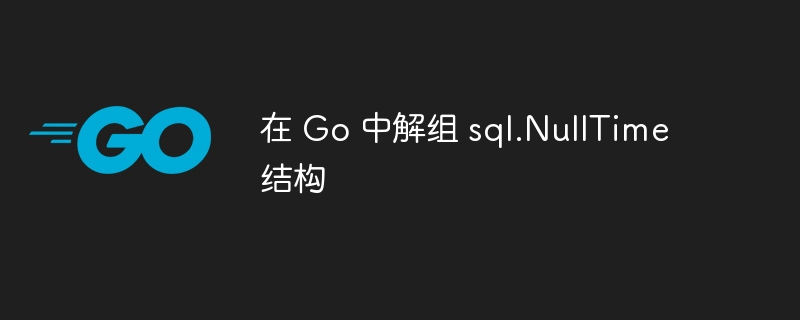Home >Backend Development >Golang >Unmarshalling sql.NullTime structures in Go
Unmarshalling sql.NullTime structures in Go
- PHPzforward
- 2024-02-09 14:42:091536browse

php Editor Xiaoxin In the Go language, we often use the sql.NullTime structure to process the time field in the database. The NullTime structure can represent a nullable time value and is very suitable for handling null values in the database. In this article, we will explain how to unmarshal a sql.NullTime structure and how to correctly handle null situations that may exist within it. Whether you are a beginner or an experienced developer, this article will provide you with clear guidance to help you better understand and use the NullTime structure.
Question content
Given
type NullTime struct {
Time time.Time
Valid bool // Valid is true if Time is not NULL
}
and
type PayinCount struct {
DateShiftStart sql.NullTime `json:"dateShiftStart"`
DateShiftEnd sql.NullTime `json:"dateShiftend"`
}
When I process the following JSON
{
"dateShiftStart":"2023-10-16",
"dateShiftEnd":"2023-10-23"
}
and
var payinsCount PayinsCount
err = json.Unmarshal(body, &payinsCount)
if err != nil {
sendErrorResponse(w, err.Error(), http.StatusBadRequest)
return
}
Where sendErrorResponse is the following auxiliary process
func sendErrorResponse(w http.ResponseWriter, err string, statusCode int) {
messageStatusCode := MessageStatusCode{
Message: err,
StatusCode: statusCode}
w.WriteHeader(statusCode)
json.NewEncoder(w).Encode(messageStatusCode)
}
I received the following message
{
"message": "json: cannot unmarshal string into Go struct field PayinsCount.dateShiftStart of type sql.NullTime",
"statusCode": 400
}
how to solve this problem?
Workaround
I ended up using the following. I added the following types.
type NullDate sql.NullTime
Then I changed the PayinsCount to use NullDate
type PayinsCount struct {
DateShiftStart NullDate `json:"dateShiftStart,omitempty"`
DateShiftEnd NullDate `json:"dateShiftend,omitempty"`
}
Then I created
// UnmarshalJSON for NullDate
func (nd *NullDate) UnmarshalJSON(b []byte) error {
s := string(b)
s = strings.ReplaceAll(s, "\"", "")
x, err := time.Parse(time.DateOnly, s)
if err != nil {
nd.Valid = false
return err
}
nd.Time = x
nd.Valid = true
return nil
}
Now when I process the following JSON
{
"dateShiftStart":"2023-10-16",
"dateShiftEnd":"2023-10-23"
}
and
var payinsCount PayinsCount
err = json.Unmarshal(body, &payinsCount)
if err != nil {
sendErrorResponse(w, err.Error(), http.StatusBadRequest)
return
}
It works. I ended up with a valid PayinsCount instance.
For completeness, here is the MarshalJSON function for NullDate
// MarshalJSON for NullDate
func (nd NullDate) MarshalJSON() ([]byte, error) {
if !nd.Valid {
return []byte("null"), nil
}
val := fmt.Sprintf("\"%s\"", nd.Time.Format(time.DateOnly))
return []byte(val), nil
}
Note the escaped double quotes - without them the encoding/json marshaling code processes the date string in 3 chunks and I get the following error
error(*encoding/json.SyntaxError) *{msg: "invalid character '-' after top-level value", Offset: 0}The above is the detailed content of Unmarshalling sql.NullTime structures in Go. For more information, please follow other related articles on the PHP Chinese website!

